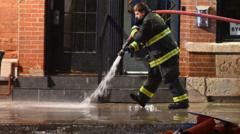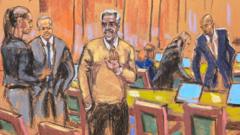As 133 cardinals gather to elect a new Pope, the handling of sexual abuse claims against clergy under Pope Francis remains contentious, as survivors like Alexa MacPherson express their discontent over insufficient reforms by the Church.
Pope Francis' Legacy Under Scrutiny as Survivors Call for Action Against Abuse

Pope Francis' Legacy Under Scrutiny as Survivors Call for Action Against Abuse
Questions rise over whether the late Pope Francis did enough to combat clergy sexual abuse during his tenure.
In the shadows of the Vatican, as cardinals convene to select the Church's next leader, the legacy of outgoing Pope Francis is under intense examination, particularly concerning his approach to the pervasive issue of clergy sexual abuse. Despite some progress in recognizing victims and initiating certain reforms, many survivors feel that the Pope's efforts fell significantly short.
Alexa MacPherson, who suffered abuse from Catholic priest Peter Kanchong from the age of three, reflects on her harrowing experience. “For me, it was pretty much an everyday occurrence,” she recalled about the abuse that began in her early childhood and continued for years. Despite the eventual intervention by her father and the legal repercussions for Kanchong, MacPherson believes that the actions taken by the Church at that time were primarily aimed at shielding itself from scandal rather than supporting victims.
“There's just so much more that the Church and the Vatican and the people in charge can do,” she asserted, voicing her disappointment in Pope Francis' leadership in tackling such a critical issue.
A letter from former Boston Archbishop Bernard Law, unearthed long after the events, reveals an institutional mindset focused on protecting the Church rather than addressing accusations of molestation. Despite acknowledging that Kanchong was deemed unsuitable for ministry due to his psychological issues, Law pressed to have him returned to Thailand, citing the potential for scandal.
Fast forward to today, where survivors and advocates continue to grapple with the Church’s legacy of secrecy surrounding sexual abuse. While some commend Pope Francis for moving towards greater transparency, critics argue that substantial changes are still lacking. Legislative revisions under his tenure do not compel the Church to disclose all allegations and maintain vague guidelines for reporting misconduct.
MacPherson’s lawyer, renowned attorney Mitchell Garabedian, continues to assert that the Church's refusal to fully open up past records keeps many survivors from achieving justice. “We have to litigate in court to get documents, nothing really has changed,” he highlighted, emphasizing the ongoing challenges victims face to hold the institution accountable.
As the Church matures into a new epoch with the election of its next leader, survivors like MacPherson remain skeptical. "You cannot possibly do any of that until you truly acknowledge those sins, and you hold those people accountable," she implored, stressing the necessity for honest accountability and true reform within the Vatican walls.
With former Cardinal Bernard Law’s controversial posthumous recognition highlighting the Church's struggles for accountability, the question lingers: will the next Pope have the will to confront and dismantle the systemic issues plaguing the Church's handling of sexual abuse? Now, as they prepare to choose a successor, the voices of survivors serve as a poignant reminder that long-standing changes are critical for the Church's future.
Alexa MacPherson, who suffered abuse from Catholic priest Peter Kanchong from the age of three, reflects on her harrowing experience. “For me, it was pretty much an everyday occurrence,” she recalled about the abuse that began in her early childhood and continued for years. Despite the eventual intervention by her father and the legal repercussions for Kanchong, MacPherson believes that the actions taken by the Church at that time were primarily aimed at shielding itself from scandal rather than supporting victims.
“There's just so much more that the Church and the Vatican and the people in charge can do,” she asserted, voicing her disappointment in Pope Francis' leadership in tackling such a critical issue.
A letter from former Boston Archbishop Bernard Law, unearthed long after the events, reveals an institutional mindset focused on protecting the Church rather than addressing accusations of molestation. Despite acknowledging that Kanchong was deemed unsuitable for ministry due to his psychological issues, Law pressed to have him returned to Thailand, citing the potential for scandal.
Fast forward to today, where survivors and advocates continue to grapple with the Church’s legacy of secrecy surrounding sexual abuse. While some commend Pope Francis for moving towards greater transparency, critics argue that substantial changes are still lacking. Legislative revisions under his tenure do not compel the Church to disclose all allegations and maintain vague guidelines for reporting misconduct.
MacPherson’s lawyer, renowned attorney Mitchell Garabedian, continues to assert that the Church's refusal to fully open up past records keeps many survivors from achieving justice. “We have to litigate in court to get documents, nothing really has changed,” he highlighted, emphasizing the ongoing challenges victims face to hold the institution accountable.
As the Church matures into a new epoch with the election of its next leader, survivors like MacPherson remain skeptical. "You cannot possibly do any of that until you truly acknowledge those sins, and you hold those people accountable," she implored, stressing the necessity for honest accountability and true reform within the Vatican walls.
With former Cardinal Bernard Law’s controversial posthumous recognition highlighting the Church's struggles for accountability, the question lingers: will the next Pope have the will to confront and dismantle the systemic issues plaguing the Church's handling of sexual abuse? Now, as they prepare to choose a successor, the voices of survivors serve as a poignant reminder that long-standing changes are critical for the Church's future.





















